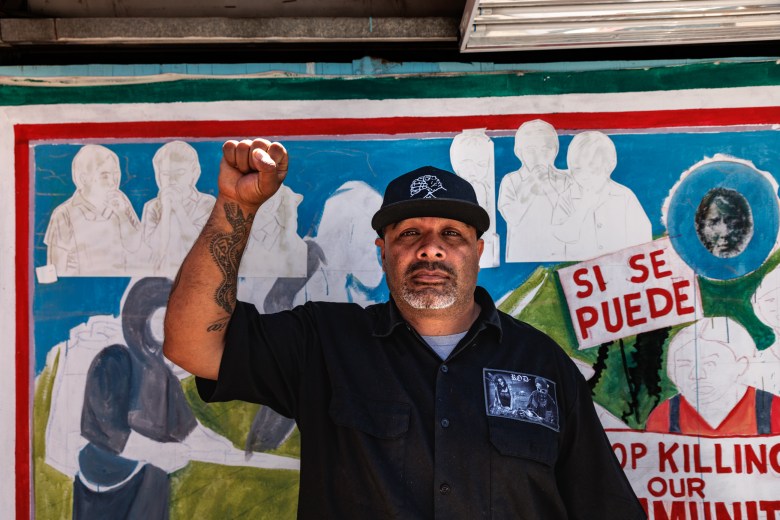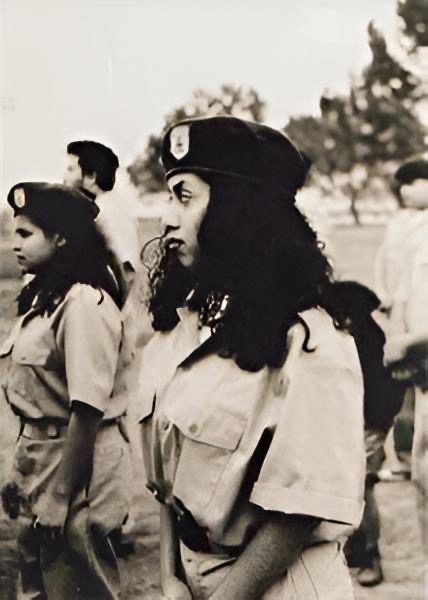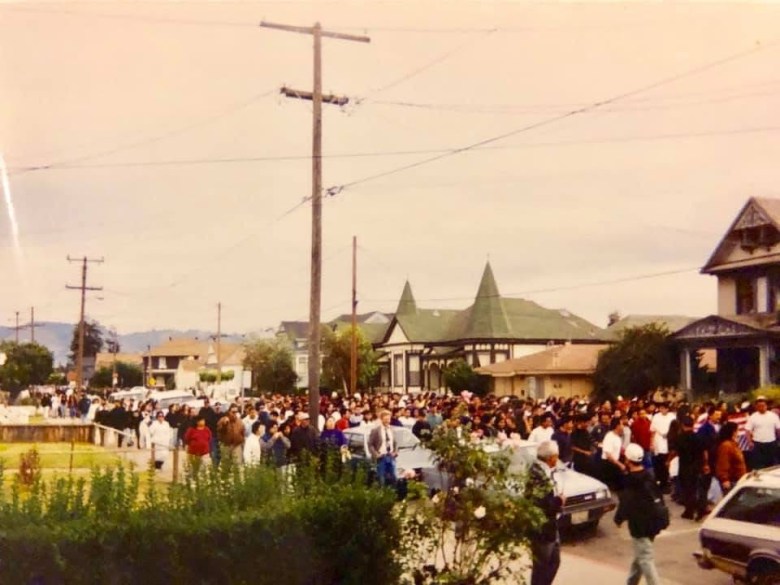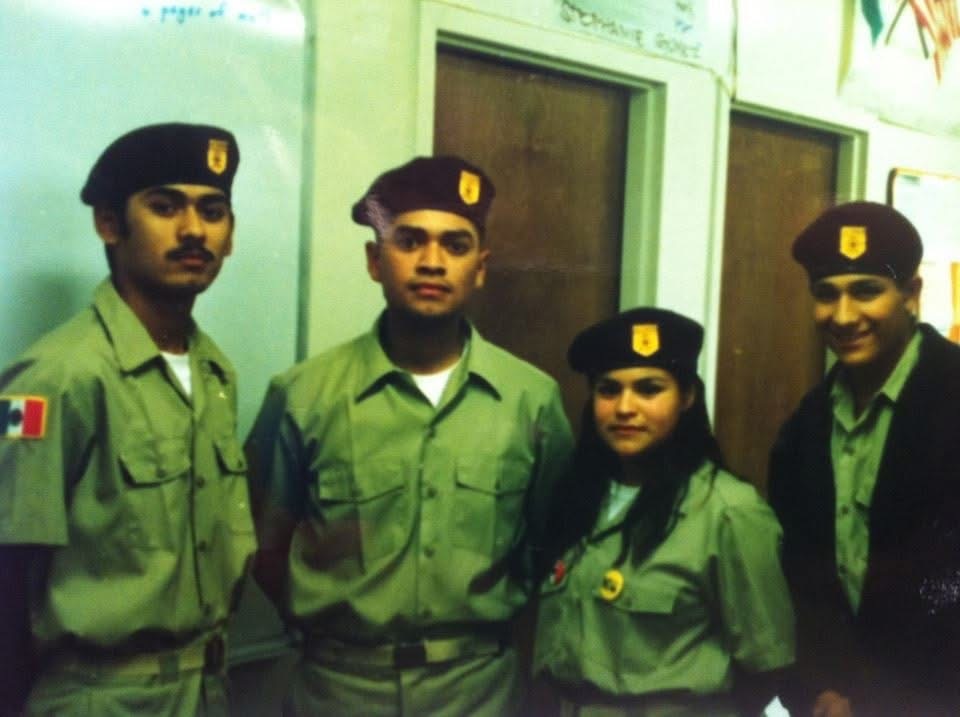Quick Take
Watsonville activists have relaunched a new chapter of the Brown Berets, a Chicano activist group established in 1967. The chapter relaunched this year in response to the Trump administration’s anti-immigrant rhetoric and aggressive deportation tactics.
When Omar Dieguez led a high school walkout in 1994, marching 10 miles from Aptos High School to downtown Watsonville to protest anti-immigrant legislation as a member of the Brown Berets, he found his calling as a teenage activist.
Now, nearly three decades later, Dieguez is helping relaunch the organization that shaped his youth, hoping to inspire a new generation facing familiar battles over immigration and civil rights.
“We have to make sure that we can make leaders to make the changes for tomorrow,” said Dieguez, now a youth mentor at Santa Cruz-based Barrios Unidos who is currently on a 30-day hunger strike in protest of pesticide applications near schools.
 Watsonville native Omar Dieguez is a youth mentor at Santa Cruz-based Barrios Unidos. Credit: Kevin Painchaud / Lookout Santa Cruz
Watsonville native Omar Dieguez is a youth mentor at Santa Cruz-based Barrios Unidos. Credit: Kevin Painchaud / Lookout Santa Cruz
The Brown Berets were a Chicano activist group first established by high school students in East Los Angeles in 1967 to address the continuous discrimination against and mistreatment of Latinos, and focused on issues affecting their community, such as police brutality and education. The group was inspired by the Black Panther Party, adopting a militant stance in its organizing.
The Watsonville chapter initially formed in 1994 during an era that mirrors today’s political climate — as a response to then-California governor Pete Wilson’s Proposition 187, which sought to restrict undocumented immigrants’ access to public services, including education and health care.
The group’s original founders, Felipe Hernandez and Luis Alejo, went from being college student organizers to becoming political leaders today. Hernandez is a Santa Cruz County supervisor, and Alejo, a former Watsonville mayor, is now a county supervisor in Monterey County.
“As a young 19-year-old, seeing that injustice and that hard-working members of our community were being scapegoated by Gov. Pete Wilson, it drove me to activism,” Alejo said.
The Brown Berets’ revival comes at a time when immigration issues are again dominating national politics, much as they did in the 1990s. After seeing the countless deportations ordered by the Trump administration, Dieguez said community members in Watsonville saw the need to organize with the goal of advocating for the Latino and immigrant communities, and also to inspire the young people. Reestablishing the Brown Berets felt like the right place to start, Dieguez said.
Current chapter
While the group is still in its early stages of organizing, Dieguez hopes to replicate the welcoming environment he experienced as a teenager when the Brown Berets first emerged in Watsonville in 1994. At the time, the group provided a space for younger people to feel empowered to lead and stand up for the issues they cared about.
The current chapter in Watsonville is a mix of students and adults of all ages, said Dieguez. “If you want to be a part of this group, you are welcome,” he said. Many of its current members were previously involved with the Berets, and are there to “pass on the baton” to the next generation.
“It’s really so that we can empower them and give them a voice, especially with what’s going on right now,” he said. “We have to make sure that we can make leaders to make the changes for tomorrow.”
Brown Berets’ Watsonville beginnings
 Ruth Alejo, sister of Monterey County Supervisor Luis Alejo, as a Watsonville Brown Beret. Credit: Via Luis Alejo
Ruth Alejo, sister of Monterey County Supervisor Luis Alejo, as a Watsonville Brown Beret. Credit: Via Luis Alejo
Unlike today, there was no social media to raise awareness when the Brown Berets first formed in Watsonville in the 1990s, because it didn’t exist, Hernandez said. The Berets were a pure grassroots effort, passing out handmade flyers to community members.
The group’s first meeting, held at the Marinovich Community Center on 2nd Street in Watsonville, was small, said Alejo. He and Hernandez had brought along their younger siblings, and about 20 high school students showed up. “None of us had done community organizing,” said Alejo. “We had no adult mentors. We had none of that. We were all trying to figure it out by ourselves.”
Hernandez told Lookout that the Brown Berets would often do what he called “barrio walks,” which meant going door to door in the community and informing residents about current events and policies that impacted them.
Since its inception, the Brown Berets emphasized creating a space for youth to feel motivated to organize and chase their dreams. Both Hernandez and Alejo told Lookout they would often take students to nearby colleges and universities, like UC Berkeley and CSU Chico, to meet people with similar experiences.
Hernandez said it was important for students to see themselves in different types of settings, including higher education.
The organization also supported initiatives and walkouts led by students like Dieguez, said Alejo. The Brown Berets attended school board meetings when the Pajaro Valley school district dealt with overcrowded high schools.
“I found a group that I could relate with that believed in me and supported me,” said Dieguez. “That’s when I became a Brown Beret. What I liked about them was that they were nurturing.”
As a teenager, Dieguez led a walkout against Prop 187, making signs early in the morning, and convinced fellow classmates at Aptos High School to join him as they arrived on campus, he said. The demonstration made its way to downtown Watsonville, which is how Dieguez first met Hernandez and Alejo.
“They walked 10 miles, all the way from Aptos High to the placita in Watsonville,” Alejo recalled. “We said, ‘Who are these folks? We got to meet them.’ And that’s how we met Omar.”
Dieguez said the Brown Berets gave him an opportunity to be himself, talk about the problems that he was facing and also be introduced to Indigenous practices, like going to sweat lodges and learning about the ceremonial dances.
It’s the atmosphere that he and other former Brown Berets want to recreate with this new era.
 Students from Watsonville and Aptos high schools during a walkout in protest of Prop 187. Credit: Via Luis Alejo
Students from Watsonville and Aptos high schools during a walkout in protest of Prop 187. Credit: Via Luis Alejo
The current chapter of Brown Berets in Watsonville, said Diegez, is autonomous from other chapters in the country. “We do things our way,” he said. While there are similarities in how they operate, like being community-focused in their organizing, they are not militarized nor do they have a hierarchical structure. There’s nobody in charge of the group, said Dieguez; rather all decisions are made as a collective.
Dieguez understands that discussing politics and current events might not be well-suited to a school setting, which is why having a place to freely talk is crucial.
“This is your space. Let’s talk about what’s concerning you. Let’s talk about whatever’s on your mind,” he said.
At meetings, the group does what Dieguez calls “each one, teach one,” where members are given 15 minutes to speak about a topic of their choosing, he said. Some members have spoken about a variety of topics like pesticides, school resource officers and community organizing to the rest of the group. The school resource officer program at Pajaro Valley Unified School District employs law enforcement officers and pairs them with mental health clinicians at its high schools. The program has been widely criticized, with opponents citing studies that the presence of law enforcement on school campuses disproportionately affects students of color.
The Brown Berets are always learning something new and looking for community events to attend and support, said Dieguez.
“We would do things in the community. We would hold events, concerts and we would go to school board meetings and advocate for our rights,” said Dieguez. “We would advocate for other students that were facing discrimination.”
While the current chapter of the Berets is still building its capacity, Dieguez said one of its goals is to host community events in the future. He’s also actively recruiting students to join the Brown Berets during his visits to local schools during his 30-day fast.
While no longer directly involved in the Brown Berets, both Hernandez and Alejo are aware that the group is organizing, and are very supportive of it restarting in Watsonville. Hernandez added that the group is an opportunity for the youth to get involved in activism and civic engagement.
“I hope that the young people getting involved today will transition their anger and the injustice they see into activism,” said Alejo. “The restart of the Brown Berets couldn’t come at a better time because of everything going on, and it’s only going to get worse.”
Have something to say? Lookout welcomes letters to the editor, within our policies, from readers. Guidelines here.
